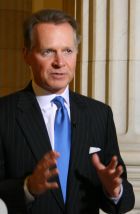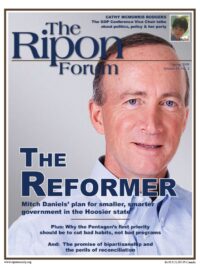
If there was ever a time when the American people needed a clear, undiluted voice in Washington, it’s now. Working families are facing tremendous economic difficulties and we remain engaged in conflicts across the globe. And yet, the residents of four states — Illinois, New York, Colorado, and Delaware – haven’t elected their newest Senators. Those same Senators are now voting on the critical economic issues of our time.
Some of my colleagues and I believe this is undemocratic. The people of those states, and every state, deserve a voice in their representation. That is why I, along with Senators Russ Feingold (D-WI) and John McCain (R-AZ) and House Judiciary Committee Chairman John Conyers (D-MI), have proposed a constitutional amendment to require ALL U.S. Senators be duly elected by the people they represent.
We have not proposed this amendment as a reaction to the people chosen to fill the recent Senate vacancies, but because of the people they represent. They are understandably outraged at some of the gamesmanship that surrounded the most recent Senate appointments. These incidents don’t need to be recounted yet again, but suffice it to say, they have brought back to the forefront of American discussion the need for popular elections when deciding our representatives in both bodies of Congress.
I believe the amendment we are proposing is a “perfecting” amendment to the 17th amendment to the Constitution. After years of backroom deals, this amendment reformed the Senate-selection process by instituting direct elections. It left to the states the authority to decide what to do when an out-of-cycle vacancy came up. Most states chose to allow their governors to make appointments. A few, including Wisconsin, chose to leave it to the people, calling for special elections. While our amendment does call for all Senators to be elected, it does not dictate the terms of those elections, leaving that to the states. I view this proposal as the fulfillment of the reform effort that began with the 17th amendment nearly a century ago.
“We have not proposed this amendment as a reaction to the people chosen to fill the recent Senate vacancies, but because of the people they represent.”
Some argue that special elections are too expensive and time consuming. This is an argument is a familiar one, and does have resonance at a time when State budgets are stretched very thin. However, I do not believe budget constraints nullify the imperative for electing our leaders.
Others, like columnist George Will, have argued that this amendment only weakens the pillars of federalism that the Founders carefully constructed. Mr. Will recently wrote in the Washington Post that our Constitution created distinct electors for the three elected bodies of the federal government, in order to enhance the separation of powers that provides the critical checks and balances in our federalist system. The President was to be elected by the electoral college, the Senate by the state legislatures and the House directly by the people.
With this perspective in mind, the 17th amendment would appear to have undermined the founder’s intentions, and today’s proposed amendment would undermine them further. I respect Mr. Will’s point of view. I, too, look to the founder’s original intentions and do not take amending the Constitution lightly. At the same time, I believe that in addressing this matter we must look at the history of our electoral processes – not just how they were envisioned at our nation’s founding, but how they have been conducted in practice.
From a purely academic perspective, it is interesting to consider whether the authors of the 17th amendment could have plotted a reform course that was truer to the founder’s intentions. But the reality today is that we now have a nearly 100-year tradition of directly electing our Senators. This practice has become an integral part of American democracy. Trying to undo a century of our history simply is not a viable option. The American people elect their Senators, and would not accept any other method. Yet the current system does have a loophole. The large number of sudden vacancies in the Senate this year has made the consequences of this loophole very clear. Our proposed amendment will address this challenge.
A few years ago, the issue of preserving the direct election of our representatives was raised within the context of a continuity plan for Congress in the event of a catastrophe and the deaths of more than 100 members of the House. Congressman Jim Sensenbrenner (R-WI), another original co-sponsor of our amendment, and I argued vigorously for the direct election of all House members, as the Constitution mandates, under any circumstance. At the time, we argued that holding and participating in elections, even in the event of a catastrophe, was essential to keeping our democracy vital and functioning. We were joined by an overwhelmingly bipartisan majority of our colleagues.
Senate vacancies are no less significant than vacancies in the House. Yes, they should be filled as quickly and fairly as possible. But most important, they should be filled by the American people.
David Dreier represents the 26th District of California in the U.S. House of Representatives.




